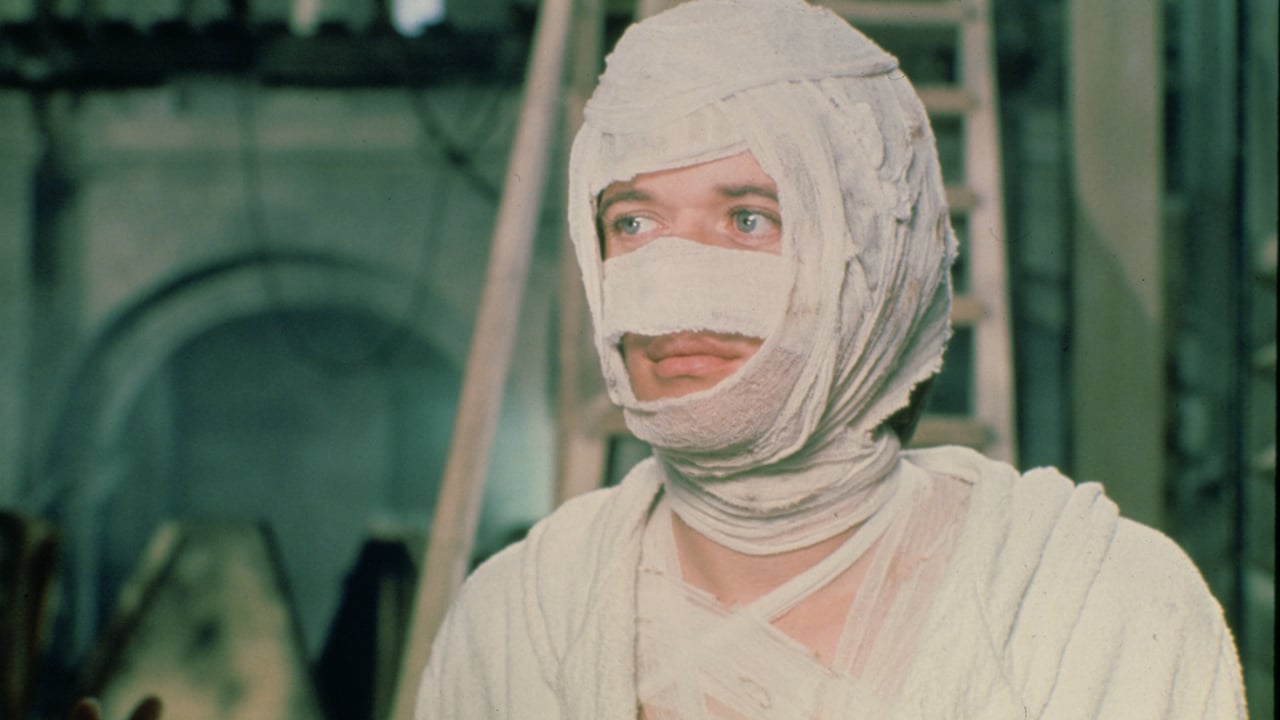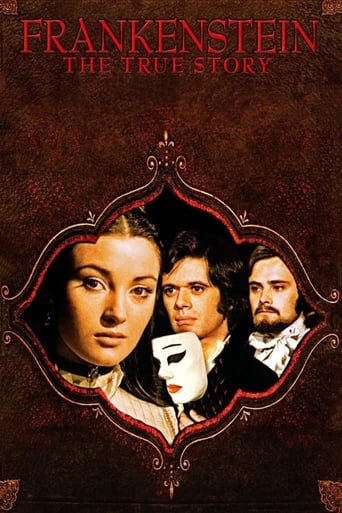


A bit overrated, but still an amazing film
... View MoreInstead, you get a movie that's enjoyable enough, but leaves you feeling like it could have been much, much more.
... View MoreBy the time the dramatic fireworks start popping off, each one feels earned.
... View MoreIt's easily one of the freshest, sharpest and most enjoyable films of this year.
... View More"Frankenstein: The True Story" is what happens when a literary adaptation is allowed to run riot over dramatic elements. Christopher Isherwood is a highly respected writer, but someone should have stopped him from this flaccid reverie only partially based on Mary Shelley's story.During the course of the 3-hour version of this TV movie, you can catch the author making heavy-handed references to "Pygmalion," "Dr. Jekyll and Mr. Hyde," "The Hands of Orlac," "Tales of Hoffmann," and "Fu Manchu" among others. It almost turns into a parlor game to catch the petty thefts from other sources.Perhaps the whole thing might have gone better with another director. I've never seen a Jack Smight movie without feeling that he's somehow fumbled it, slack rhythms and the camera often in the wrong place. This too feels like a misfire. Pyrotechnics and lava lamp effects notwithstanding, the great set pieces are uniformly feeble. It's like he doesn't shoot the story, but shoots around it.Smight certainly gets bad performances out of well-remembered actors. James Mason is helplessly inadequate trying to convey the emotion of terror. Agnes Moorehead is over the top, Michael Wilding produces his dazed smile and little more, Margaret Leighton is actively embarrassing, Sir John Gielgud perfunctory and Sir Ralph Richardson's blind hermit is perhaps the worst performance of his film career.I suppose it's not possible to stage the love triangle of Victor Frankenstein, the girl he wants to marry and the male monster he creates without raising an eyebrow from time to time, but this retelling of the tale strongly evokes the sexual ambiguities of Isherwood's "Cabaret." The monster is played not by a hulk but by a hunk, a soulful young stud who loves Mozart opera. The first meeting of Frankenstein and his monster plays like a pickup. The character of Dr. Polidori is openly contemptuous of "mere" women, and it is he, not the monster, who disrupts Victor's wedding night. Generally women come off very badly, the older ones caricatures of old bags, and the younger ones annoying, even nightmarish, in their sexual demands.Despite the starriness of the supporting cast, this film is merely a curiosity. The famous Karloff/Whale version remains the first among equals, and the Oscarsson/Floyd "Terror of Frankenstein" conveys the book the best among the color versions.Unfortunately, Mel Brooks actually gets closer to Mary Shelley's vision than this film does. Only for completists.
... View MoreWhat can you say about one of the best TV movies ever made? I want to apologize in advance because I wanted to talk about the novel, which although I read just a few short years ago my memory is failing so I apologize in advance for inaccuracies. First of all, this has to be one of the greatest stories ever written. It's just so rich in themes, and I think when someone takes the novel on, the closer they adhere to Shelley the better. The clichéd Frankenstein's creature the lumbering, mindless killer just can't hack it on a thematic level. This version's creature is not exactly verbose, but his emotions and feelings toward his creator are never in doubt, and vice-versa. To be honest, the novel was far from perfect, and curiously gave the creature a first-person dialogue in many chapters. In lieu of this, the novel I think begs to be adapted to the cinema because its premise is so strong and the drama alone between Victor Frankenstein and his tragic creation effects a lot of dynamism. The only problem I had with the adaptation is Polidori. I don't recall him being in the novel (forgive me if I'm mistaken), and his motives are not that clear in the story. Hence, he really does feel like a fifth wheel in many respects. Witness the fact that he happens to be on the same ship bound for America as the Frankensteins. After the death of Prima, one could say that Polidori's role should come to an end. I think the disintegration of the creature in this version is a novelty, and I think it worked very well.
... View MoreEvery film version of FRANKENSTEIN has taken tremendous liberties with Mary Shelly's celebrated 1818 novel, and although it retains the core idea of the book this one is no exception. Produced for television by Universal Studios in 1973, the film contains a host of characters and ideas that draw more from previous film versions than from the original novel. More interestingly, however, it introduces a number of distinctly original concepts as well.Simply stated, the film has a highly disconcerting and surprisingly overt homo-erotic edge. Instead of the inevitable "mad doctor" typical of films, Victor Frankestein is a remarkably handsome young man in the form of actor Leonard Whiting, a performer best known as Romeo in the famous 1968 ROMEO AND JULIET. He is seduced into the experiment by the equally handsome but distinctly odd Henry Clerval (David McCallum)--and not only do the two actors play the relationship in a disquietingly touchy-feely way, Clerval takes exception to Victor's fiancée Elizabeth (Nicola Pagett) and she returns the favor, demanding that Victor choose between them.Lest any one miss the implications, the creature is played by none other than Michael Sarrazin, and while many men may be described as handsome, Sarrazin is among the few who can be justly described as beautiful. He arises from the laboratory table barely decent in a few strategically placed bandages, and when his facial covering is pulled aside by the eager Dr. Frankenstein we are treated to a lingering image of glossy black hair, pale complexion, remarkably liquid eyes, and lips that would make Vogue model weep with envy. Dr. Frankenstein takes him to his own apartment, where he educates this child-like innocent and very generously allows the creature to sleep in his own bed.But, as in all FRANKENSTEIN movies, the experiment goes awry, and when it does the same disconcerting homo-erotic overtones take yet another turn. Due to some unknown error in the creation process, the creature begins to deteriorate in appearance--and instead of continuing to treat him kindly, Frankenstein keeps the creature locked up, becomes verbally abusive to him, and no longer allows the creature to sleep in his bed, relegating him to a cramped mattress on the floor. At the same time, Frankenstein is approached by the mysterious Dr. Polidori (the legendary James Mason), an oily scientist with a flair for hypnosis who claims to know what went wrong.Polidori insists that they abandon the creature and create a new one: a woman, and when this new creation emerges from an entirely different process she too is remarkably beautiful; indeed, she is none other than Jane Seymour. But whereas the original creature was a gentle creature who only learned violence from Frankenstein's hateful rejection, this new entity is strangely icy, almost snake-like from the very beginning--and the male creature, now both vicious and wildly jealous, will exact a horrific toll upon all concerned.It is worth pointing out that the script for this version of FRANKENSTEIN was co-authored by Christopher Isherwood (1904-1986), one of the few openly gay writers of his era. Sexuality in general and homosexuality in particular forms a theme in many of Isherwood's works, so it would seem reasonable to assume that he was responsible for the homo-erotic elements of the film. Jack Smight's direction does not offer anything nearly so interesting as the script, but it is workman-like, and while the production values tend to be a shade too baroque for their own good one never lacks for something to look at on the screen.The cast is also quite good. At the time, the film was looked upon as a "television event," and it drew a host of noted actors, including John Gielgud and Agnes Moorehead. No one would accuse Leonard Whiting of being a great screen talent, but he acquits himself very well; so too does David McCallum, Nicola Pagett, and the always memorable James Mason. But the real knock-out performances here are by Sarrazin and Seymour, who truly blow the lid off our ideas of what a FRANKENSTEIN movie should be--and when they square off the result is unsettling in a truly unexpected way. In terms of the DVD itself, the film quality is considerably better than the rare late-night showings I've occasionally seen on television, but I would not describe it as pristine, and I found I frequently had to bump up the volume on the soundtrack.If you are looking for something with which to scare yourself silly, you might want to give this version FRANKENSTEIN a miss; although it has a few visceral moments, the jolts involved are largely psycho-sexual. But if you are open to the sexually subversive, which is particularly unexpected in a made-for-television film from 1973, you couldn't make a better choice. Recommended.GFT, Amazon Reviewer
... View MoreI first saw this as a two-part miniseries on TV in the early seventies. Several scenes left a strong impression on me (see below). When the DVD version recently became available, I bought it on the first available day. Of course, it did not live up to my childhood memories but I was not disappointed. However, my wife found it boring (too slow) and a friend thought it was stupid (with bad production moments and some silly dialogue). I agree that it is slow and that there are many portions that could have been edited down. But I still find it very worthwhile particularly for the storyline interpretations and the character issues raised.Being familiar with the novel, I realize that this version is not "true" to the original story's plot. But I believe it is much truer to the spirit of the novel than most other productions. The creature is sympathetic while still doing horrific things. Frankenstein's behavior is difficult to understand: obsessive yet easily frustrated. The bad: the added prolog, the first 5 minutes (rushed - would have been better as backstory in voice-over), bad production value (the carriage scene), silly plot devices (the hypnosis, Clerval's sudden attacks, the housekeeper's death by fright, the Polidori plan for Prima, Victor's explanation for who the creature is), the stock footage of the Arctic (not even the same film resolution).The good: the acting, the creature's makeup, the ending, the script in general ("Bravo, Victor").My favorite scenes: the severed arm banging on the cabinet during the creation, the creature's heartbreaking realization that he is no longer beautiful, Victor and the creature on the white cliffs, the creature and the blind hermit, Prima playing the piano and playing with the white cat, the horrific ballroom scene, the final Polidori scene (despite the weak special effects), the frozen deck, and the final conciliation between Frankenstein and the creature).The interesting: why is Prima evil while the Creature starts out good? Is it Polidori's training? Can either of them be considered good or evil or are they amoral? Why does Victor treat the creature poorly? Frustration over his own failure? Why is the creature never given a name?In summary, not great but a welcome mental break from the high-action low-thought films of today.
... View More